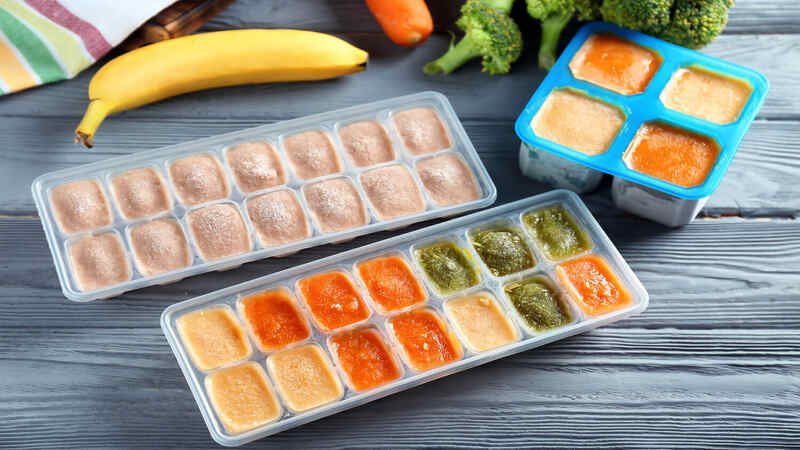
During summer, major brands start introducing various unique ice cream flavors suited for the intense Indian heat. (1). Ice cream is designed to offer a unique and enjoyable experience for people of all ages, accommodating a wide range of tastes and preferences. When your little one reaches six months, it’s time to introduce them to a variety of foods beyond breast milk. This often coincides with the period when your baby starts to sprout their first teeth. Switching to newer foods will give him all the essential nutrients he needs for healthy growth and proper development. There’s nothing quite like a baby’s first ice cream. Read on.
You may not be able to control the urge to introduce your baby to all the tongue-friendly food items that you enjoy most, and if you are one hard ice cream lover, you will be tempted to introduce this tasty haven to the star of your eyes. But be patient. The little one may resemble you and your tastes, but not his organ systems. We explain various aspects of introducing ice cream to your baby for the first time.
Is Ice Cream Safe For Babies?
Yes, ice cream is safe for babies. But there are some important considerations to keep in mind before introducing it to your little one. Begin by giving in small quantities. Excessive indulgence may be deemed unfavorable for babies.
When Can My Baby Have His First Ice Cream?

You can give your baby their first ice cream after the age of one year. By this time, their GI tract is ready to experience a wide array of family foods. Start with introducing 1 teaspoon of ice cream and observe your baby’s reaction. Store-bought ice creams are based on whole milk cream and undergo pasteurization. You have to be vigilant, as your baby can still be sensitive to milk minerals, proteins, and other ingredients.
Some reports suggest that foods and drinks like ice cream and other icy treats are poor sources of nutrients for your child, and you should avoid them. However, you can introduce ice cream to your baby in moderation after consulting with your pediatrician. Remember to exercise moderation and give them once in a while.
When Does Your Baby Enjoy Ice Cream?
It is better to wait till your baby’s age is at least one year to give the baby’s first ice cream. After one year, you can give your baby’s first ice cream in small quantities. But remember, you may need to be careful if there is a family history of allergies to milk and milk products.
Why Should You Wait to Give Your Baby’s First Ice Cream?

Generally, traditional ice cream is high in sugar and fat content. Following are a few reasons why you should wait to give your baby its first ice cream:
1. It May Cause Digestive Issues
Dairy products are also difficult for babies to digest, and babies will develop sensitivities to those ingredients. Dairy products, especially whole milk, are a major cause of tummy problems for your baby. Colic in babies can be inconvenient for both the mother and baby.
2. Presence of Additives
Many commercial brands add preservatives, food coloring, and various other artificial ingredients to the ice cream. These artificial ingredients are unhealthy for your growing baby.
3. Prone to Bacterial Buildup
Ice creams are susceptible to bacterial buildup. In recent days, Listeria and other bacterial outbreaks have hit ice cream brands. The pasteurization process kills most of the bacteria and makes ice cream safe, mostly (2). For this reason, it is better to wait till the baby is at least one year old.
4. Chances Of Tooth Decay
Even after your baby turns one year old, give Ice Cream sparingly. The sweet treat increases the risk of tooth decay, obesity, and fondness for sweets in the future. Make sure that they know ice cream is a treat for some special occasions and not an everyday thing.
5. Chances Of Getting Ice cream Headache
Not to mention that your baby may develop a headache caused by inhaling a chilly stimulus, popularly known as an ice cream headache (3). Cold-stimulating headaches are a prevalent kind of primary headache in adults and older children who consume ice cream regularly (4). So, when giving your infant ice cream, watch him to see whether he is uncomfortable.
Is It Safe For My Baby to Have It Once in a While?
Yes, it is safe for your baby to have ice cream once in a while once they cross the one-year milestone. An overindulgence of ice cream is unhealthy for babies. You can always consult your pediatrician before introducing ice cream to your baby.
Why is it Unsafe For Children Below One Year?

Several reasons make ice cream unsafe for children who have not celebrated their first birthday yet.
1. Ice Creams are Full of Sugar and Fat
Sugar and fat are not good for babies, especially before they turn one year old. Babies who eat ice cream regularly develop an addiction to sweets and sugar. This will lead to health issues in the long run.
2. Ice Creams are Low in Nutrients
Ice creams are high in sugars and low in nutrients. The sugar rush from ice creams and the taste are the reasons babies develop a liking for ice creams. Such addiction can kill the appetite, and they refuse a regular nutrient-rich diet. This can affect their health in the long run.
3. Additives
Additives and coloring agents in ice cream can cause allergic reactions, sugar addiction, and health problems and are not ideal for babies.
4. Some Ice Creams Contain Nuts or Ingredients Made From The Nuts
If a baby has an allergic condition like eczema or any of the family members (siblings, father, mother, grandparents, uncles, or aunts) has a nut allergy, keep the baby away from ice cream that has nuts in it.
5. Egg Content
Some ice creams contain eggs as the main ingredient. The egg white contains four proteins that can cause allergies ranging from mild to severe in babies below 12 months. Read more on giving eggs to the baby.
6. Ice Cream is a Dairy Product
Ice-creams are generally made from whole cream or whole milk. Even if it is pasteurized to remove bacteria, negligence in storing the ice cream can cause reactions in the baby. This can be because:
- Giving whole milk products to babies under 12 months is not recommended. Babies below 12 months cannot properly digest milk and milk products.
- Their immature kidneys cannot handle the high concentration of protein and minerals present in the whole milk.
- In some babies, the protein in the whole milk products can irritate the lining of the digestive system, leading to blood in the stool.
7. Ice Cream Vendors
Ice-creams made and sold by roadside vendors are extremely unhealthy for your little one. They often contain cheap sugar substitutes, colors, and flavoring which will play havoc with your baby’s health. You cannot be sure of their safety and hygiene level (5).
- Keep your child away from soft-serve ice cream from machines. The ice cream in the machines can become contaminated with Listeria, a type of bacteria present in contaminated food, resulting in food poisoning if the tubes on the machine are not kept perfectly clean.
- The ice cream made and sold by vendors may have bacteria buildup due to the unhygienic conditions where they made the ice cream.
- They also use poor-quality water and ingredients, especially low-grade colors and preservatives they use. This can cause infection in the baby’s digestive system and become dangerous.
- Ice cream coming in mobile trucks may not have proper storage facilities. This will result in the development of dangerous bacteria in ice cream.
8. Familial disposition for ICH
Research suggests that babies with a family history of ice cream headaches, either mother or father, are more likely to develop ICH (6).
Are There Any Benefits of Ice Cream For Babies?

An occasional serving of ice cream for babies is entirely OK. Homemade ice cream is made with milk and sugar, containing no additives. Therefore, it is safe to offer babies 1 to 2 scoops occasionally.
Disadvantages of Early Introduction of Ice Cream to Babies
Ice cream is a popular frozen dairy product that contains dietary components like fat, protein, and calcium. Ice cream produced with full-fat milk as the main ingredient is quite hard for babies to digest. This is why it is suggested to wait until the baby is at least a year old.
Precautions to Take When Introducing Ice Cream to Babies

If you give your baby ice cream sticks, be cautious as they eat them. It is preferable to provide them ice cream scoop outs to minimize any discomfort caused by that hard wooden stick to your little one.
Tips to Introduce Ice Cream to Babies
Introducing a baby’s first ice cream can be a special treat, but always ensure that it’s done safely and mindfully! Here are some tips to help make the process safe and enjoyable:
- Ice cream should be offered once in a while.
- Buy ice cream only from reputable stores.
- Inspect food handlers to ensure food safety and hygiene.
- Make sure the ice cream is scooped out in a bowl and served with a spoon.
- Always monitor your baby if they are offered ice cream sticks.
What are the Alternatives For an Ice Cream For My Baby?

Being an intelligent mother, you can always find a healthy alternative for most of the unhealthy food habits of your child. Instead of ice cream, introduce your child to:
- Freeze bananas, mango, apples, or any fruit of your choice (check with your doctor about the possibility of allergies that some fruits can cause). You can crush the frozen fruit in a blender. You have a healthy substitute for ice cream ready. Blueberries can add an attractive color to a frozen banana while blending.
- Whipped, fresh fruit smoothies are also good. As this need not be refrigerated, you can give it to your child even if the weather is cold. Always use fresh fruit. Canned fruit should be strictly avoided.
- Frozen yogurt is an easy and healthy substitute for ice cream
The perfect time for your baby’s first ice cream is when they cross the one-year milestone. Today, we have many superior brands that give priority to quality ingredients and freshness. You can select these brands as your baby’s first ice cream. As with every food, you must exercise moderation when giving ice cream to your little one.
FAQs
1. When Can Babies Have Their First Ice Cream?
Babies can have their first ice cream once they have celebrated their 1st birthday. It will be a safe bet because they have eaten practically every food group by this point.
2. Which Ice Cream is Best For Babies?
Ice cream made with the most basic components is best for babies. The homemade ice cream allows mothers to see exactly what ingredients are going into their baby’s scoop. Most store-bought ice creams contain additives and preservatives.
3. Can a Newborn Baby’s Mother Eat Ice Cream?
Yes, a scoop or two of ice cream is good for the mother of a newborn baby. Overindulgence in store-bought ice cream is unhealthy.
Reference
- Genovese A, Balivo A, Salvati A, Sacchi R. Functional ice cream health benefits and sensory implications. Food Res Int. 2022 Nov;161:111858 – https://pubmed.ncbi.nlm.nih.gov/36192980/
- Conrad AR, Tubach S, Cantu V, Webb LM, Stroika S, Moris S, Davis M, Hunt DC, Bradley KK, Kucerova Z, Strain E, Doyle M, Fields A, Neil KP, Gould LH, Jackson KA, Wise ME, Griffin PM, Jackson BR. Listeria monocytogenes Illness and Deaths Associated With Ongoing Contamination of a Multiregional Brand of Ice Cream Products, United States, 2010-2015 – https://pubmed.ncbi.nlm.nih.gov/35797187/
- Kraya T, Schulz-Ehlbeck M, Burow P, Watzke S, Zierz S. Prevalence and characteristics of headache attributed to ingestion or inhalation of a cold stimulus (HICS): A cross-sectional study. Cephalalgia. 2020 Mar;40(3):299-306 – https://pubmed.ncbi.nlm.nih.gov/31645112/
- Bonemazzi I, Pelizza MF, Berti G, Ancona C, Nosadini M, Sartori S, Toldo I. Cold-Stimulus Headache in Children and Adolescents. Life (Basel). 2023 Apr 9;13(4):973 – https://pubmed.ncbi.nlm.nih.gov/37109502/
- Dhar PK, Naznin A, Hossain MS, Hasan MK. Toxic element profile of ice cream in Bangladesh: a health risk assessment study. Environ Monit Assess. 2021 Jun 14;193(7):421 – https://pubmed.ncbi.nlm.nih.gov/34128113/
- Zierz AM, Mehl T, Kraya T, Wienke A, Zierz S. Ice cream headache in students and family history of headache: a cross-sectional epidemiological study. J Neurol. 2016 Jun;263(6):1106-10 – https://pubmed.ncbi.nlm.nih.gov/27039390/

